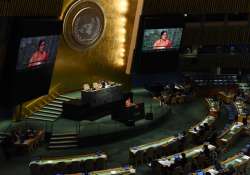India moves Paris agreement on climate change closer to reality
India moved the historic Paris agreement on climate change closer to reality on Monday by announcing that New Delhi would ratify it and submit the document to the United Nations on Gandhi Jayanthi.

India moved the historic Paris agreement on climate change closer to reality on Monday by announcing that New Delhi would ratify it and submit the document to the United Nations on Gandhi Jayanthi.
The move was greeted as "great news" by Sierra Club, a major environmental organisation. An official of the group said that it would build momentum for getting enough ratifications for the accord to come into force early.
India's External Affairs Minister Sushma Swaraj affirmed at the General Assembly New Delhi's commitment "to play a leading role in combating climate change" and said it would submit the ratification document on a day rich in symbolism, "the birth anniversary of Mahatma Gandhi who epitomised a lifestyle with the smallest carbon footprint".
For the Paris accord to come into force it needs to be ratified by 55 countries that account for 55 per cent of the world's greenhouse gas emissions. When Secretary General Ban Ki-moon held a ceremony last Wednesday for countries to submit their ratification documents, 60 countries accounting for 47.5 per cent of the emissions had complied, leaving a 7.5 per cent gap for greenhouse gas output.
When India, the third largest emitter of greenhouse gases that puts out four per cent of the world's total emissions ratifies the pact, that gap would have shrunk to 3.5 per cent, bringing the agreement closer to implementation.
"India coming in early is great news," Steve Herz, the senior attorney for the Sierra Club's International Climate Programme, told IANS. "It will build momentum for the ratification and to do it quicker."
When the climate change agreement was made in Paris in 2015, it was expected to take years before it would cross the threshold for coming into effect, but it is almost there in a matter of months, he said.
It will in fact come into effect before the November UN climate change conference in Marrakech, he said.
In her speech, Swaraj brought up Prime Minister Narendra Modi's concept of climate justice.
She explained, "In the Paris Agreement, the principle of 'Common but Differentiated Responsibilities' and 'Respective Capabilities' has been acknowledged and accepted. This makes clear that while our responsibility is common, obligations are different. Developed nations must discharge their responsibility in the search for the common good, with finance and technology transfer."
Having invoked Gandhi, she spoke of his way to save the environment. "We must curb reckless consumption, and adopt lifestyles in harmony with nature. Yoga, the storehouse of India's ancient wisdom, epitomises a sustainable lifestyle," she said.
"(For its part) India has launched an ambitious domestic effort to transform our energy mix to achieve 40 per cent energy from non-fossil fuel sources by 2030," she said.